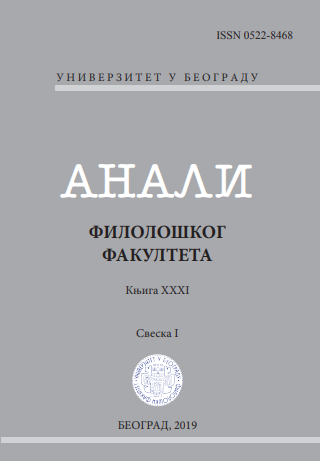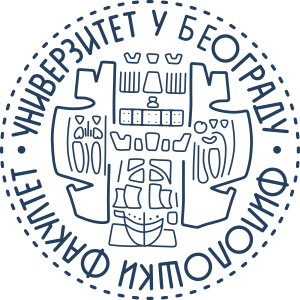Razumevanje idioma kod mlađih i starijih odraslih osoba
DOI:
https://doi.org/10.18485/analiff.2019.31.1.13Keywords:
kasniji jezički razvoj, idiomi, semantika, sintaksaAbstract
U jeziku postoje ustaljeni izrazi koji se sastoje od dve ili više reči. Oni imaju jedinstveno značenje koje se ne može izvesti na osnovu značenja pojedinačnih reči od kojih su sastavljeni. Takve jedinice u leksikonu su idiomi. S obzirom na frekventnost njihove upotrebe, razumevanje idioma je od velikog značaja za uspešnu komunikaciju.
Cilj rada je bio da se ispita sposobnost razumevanja idioma kod odraslih osoba budući da radovi stranih autora iz ove oblasti ne ukazuju nedvosmisleno da li ova sposobnost opada sa godinama. Uzorak je činilo 57 ispitanika podeljenih u dve uzrasne grupe (od 20 do 25 i od 70 do 90 godina) kod kojih se razumevanje idioma procenjivalo na osnovu definisanja deset izabranih izraza i navođenjem situacije u kojoj bi se dati primer mogao upotrebiti. Dobijeni rezultati nisu pokazali da ova sposobnost opada s godinama, ali je utvrđeno da ona i kod mlađih i kod starijih osoba zavisi od stepena izloženosti idiomima, kao i od stepena semantičke prozirnosti samog izraza. Rezultati su utoliko dragoceniji jer se odnose na ispitivanje kasnijeg jezičkog razvoja izvornih govornika srpskog jezika, te pored teorijskog mogu imati i praktični značaj kod usvajanja sintaksičkih i semantičkih svojstava leksema i izraza, kao i u radu sa decom kod koje su uočeni različiti oblici razvojnih jezičkih poremećaja.
Downloads
Published
How to Cite
Issue
Section
License

This work is licensed under a Creative Commons Attribution-ShareAlike 4.0 International License.
Authors who publish with this journal agree to the following terms:
- Authors are confirming that they are the authors of the submitting article, which will be published (print and online) in the journal Anali filološkog fakulteta by the Faculty of Philology, University of Belgrade (Faculty of Philology, Studentski trg 3, 11000 Belgrade, Serbia). Author’s name will be evident in the printed article in the journal. All decisions regarding layout and distribution of the work are in hands of the publisher.
- Authors guarantee that the work is their own original creation and does not infringe any statutory or common-law copyright or any proprietary right of any third party. In case of claims by third parties, authors commit their self to defend the interests of the publisher, and shall cover any potential costs.
- Authors retain copyright and grant the journal right of first publication with the work simultaneously licensed under a Creative Commons Attribution-ShareAlike 4.0 International License that allows others to share the work with an acknowledgement of the work's authorship and initial publication in this journal.
- Authors are able to enter into separate, additional contractual arrangements for the non-exclusive distribution of the journal's published version of the work (e.g., post it to an institutional repository or publish it in a book), with an acknowledgement of its initial publication in this journal.
- Authors are permitted and encouraged to post their work online (e.g., in institutional repositories or on their website) prior to and during the submission process, as it can lead to productive exchanges, as well as earlier and greater citation of published work.





